- Home
- Jennifer Ashley
The Untamed Mackenzie (highland pleasures) Page 14
The Untamed Mackenzie (highland pleasures) Read online
Page 14
Norwell ran his gaze up and down Fellows, obviously not liking what he saw. “So you’re old Kilmorgan’s by-blow.”
Fellows made a shallow bow, hiding the sting. “I have that honor.”
Norwell grunted. “You look like him. Kilmorgan was a mean son of a bitch, and the current duke is no better.”
Fellows took this stoically. He’d come to like Hart more and more as he got to know him, but he knew he’d waste his breath defending him to Norwell. Norwell was the sort of man who made his judgments and stuck to them, come hell or high water.
“How can speaking to me help you catch a murderer?” Norwell asked. “It was the Scranton bitch who did it, and we all know it. That entire family is mad.”
Fellows clenched his jaw to keep his temper. “New evidence has come to light that tells me it was not Lady Louisa.”
“What evidence? You’re lying. The only reason you haven’t arrested her is that she’s connected with the Mackenzies, and you have an absurd loyalty to them.”
“No, Lord Norwell,” Fellows said in a hard voice. “I’m after the truth, no matter what. One reason I came here today is that I’d like to look over your son’s bedchamber. His valet told me he often stayed in this house when he'd be in Town only briefly and didn’t want to bother opening up his own flat. Is that correct?”
Norwell looked Fellows over again, neither agreeing nor disagreeing. “You’re a bit above yourself, aren’t you, Chief Inspector? You might be a duke’s son, but you’re still a bastard.”
“Which has nothing to do with me looking at your son’s rooms.”
Norwell heaved a sigh. “What are you searching for?”
“I’ll know that when I find it.”
“This is ridiculous.”
“I’m leaving no stone unturned,” Fellows said firmly. “I want this killer found as quickly as you do and so am looking into every possibility. Don’t worry, I will do no damage to your son’s things, and leave everything as I found it.”
Norwell again looked Fellows up and down, in the most condescending way possible. He heaved another sigh, this one sounding as though it came from his toes, turned away, and pushed a bell on the desk. The butler entered almost immediately—Fellows suspected the man had been listening outside the door.
“Take the inspector up to Frederick’s old rooms,” Norwell said. “Stay there with him, and don’t let him steal anything.”
Fellows didn’t react at all to the statement. Norwell was grieving—Fellows allowed that. Otherwise, he’d be tempted to punch the man in the mouth. Fellows made himself turn his back and follow the butler out of the library without a word.
The butler led him up another flight of stairs. As they entered a large, dim bedchamber, Fellows bade him go down and tell Sergeant Pierce to come up. No one searched a room better than Pierce. He could find nooks and crannies that most missed, and he could do it rapidly and thoroughly. Fellows had always suspected that Pierce, in his youth, might have been a thief, but he’d never asked directly.
The butler looked put out, but he went. Slowly. The stairs creaked, one at a time, as he descended.
Fellows pulled open the heavy curtains, letting cleansing sunlight into the too-dark room. The room was musty—Norwell must have shut it up at his son’s death and not allowed anyone in. Grieving people often wanted to hide away their loved ones’ belongings.
The chamber was elegantly furnished, as befitting this Berkeley Square mansion. A tester bed with brocade draperies held prominence, a sofa stood near the fireplace, a writing table was positioned near the window, and a bookshelf full of leather-bound volumes took up part of one wall. Thick carpets covered the floor, and a dressing room with a wardrobe and a tall mirror opened off the main room.
Fellows took advantage of the butler’s absence to start going through the writing table. He pulled out drawers, sorted through the few letters he found, and turned the drawers upside down to look for anything hidden beneath. He finished soon, the contents disappointingly sparse. Hargate’s recent correspondence had been in his flat in Piccadilly, which Fellows had read when he’d searched there, but he’d found nothing of interest. Fellows wasn’t certain what he hoped to find here, in Hargate’s boyhood bedroom, but it was the one place Fellows hadn’t searched yet.
By the time Fellows heard Pierce’s step on the stairs, he was under the large bed, looking beneath the slats for hidden treasures. Nothing.
Fellows crawled out and brushed himself off, and was on his feet pulling out books from the bookcase by the time Pierce and the butler arrived. Pierce, who prided himself on his forthrightness, shut the door in the butler’s face. “Fetch us some tea, there’s a good chap,” he called through the door. “And coffee for the Chief Inspector. He don’t like tea.” He turned away and surveyed the room. “Anything, guv?”
“Nothing yet. See what you can make of it.”
Pierce went to work. Fellows trusted his sergeant’s skill, and for good reason. Pierce could feel every corner of a pillow without cutting it open, tell if a mattress or featherbed held any secrets. He checked every inch of wainscoting and the paneling around the windows, tested bricks of the fireplace, turned over chairs, and patted the curtains to see if anything resided between drapery and liner or inside the hems. Pierce flipped carpets up and tested floorboards, then went through the books and examined their bindings.
Undaunted by finding nothing, Pierce entered the dressing room. Fellows continued to look through the letters he’d taken from the drawer. Presently the banging and rustling in the dressing room stopped, and Pierce said, “Eureka, sir.”
Fellows didn’t get his hopes up. This had been Hargate’s room when he’d been a young man living at home. Pierce might have found nothing more than a university lad’s old stash of cigarettes or malt whiskey.
Pierce was crouching on the floor in the dressing room, having folded back the carpet. He’d lifted a loose board from the floor and now pulled out a square box that had been resting on the joists beneath.
The box was locked, but the lock was small and decorative, more to keep out those who would have respected his privacy anyway. Fellows put the box on the dressing table, took out a blunt tin nail he kept for such occasions, and quickly forced open the lock.
Would he find cheroots and love poems to long-ago schoolgirls? Fellows’ heart beat faster as he lifted the lid.
He found a notebook. He took it out, noting that it was clean and crisp. Almost new.
“Ah,” Pierce said. “Wonderful things, notebooks. Can tell you so much about a chap. His personal thoughts. Locked in a box under the floorboards.”
Fellows sat down on the chair at the dressing table and opened the notebook. As he’d suspected, it wasn’t a straightforward, written journal of everything the bishop had been up to, whom he’d angered, and who wanted to kill him. It was a series of cryptic notes, but Hargate had been kind enough to date them. He’d made the last entry the morning of the garden party.
“Bring the box,” Fellows said grimly. “We’re taking this.”
Chapter Fourteen
Lloyd Fellows’ flat was in a lane off the Strand in a respectable house that retained some of the elegance of the past. The landlady was gracious enough to let Louisa and Daniel upstairs to Fellows’ rooms once Daniel explained who they were—and charmed her with his smiles and youthful innocence. He portrayed innocence very well.
The flat had four rooms—a sitting room which doubled as a dining room, a small office with a cluttered desk, and a bedroom with a bath chamber beyond. Daniel solved Louisa’s problem of wondering if she would ever dare enter Fellows’ bedroom by opening the door and barging in himself. Of course, Louisa had to follow to make sure he stayed out of mischief.
“He won’t mind,” Daniel said. “I come here all the time for a bit of a chat. Ah, there it is.” He picked up a book from Fellows’ bedside table. “I lent him this a while ago. Thought it might be in here.”
Louisa gave him a sharp loo
k. It would be just like Daniel to pretend he’d given Fellows the book in order to have an excuse for snooping in the man’s bedroom.
She ought to tell him they should leave the room and close the door. But Louisa stood in the middle of it, absorbing everything about Lloyd Fellows.
His bed was large, with low posts and no hangings. Neatly made, the pillows plump, a quilt folded across the bottom. Louisa wondered if his mother had sewn the quilt.
The room was small, most of it taken up with the bed. Fellows didn’t have many decorative touches, except a few photographs in frames on top of the high dresser. Louisa moved to look at them.
One photo was of his mother, taken when she was younger. Louisa had met Mrs. Fellows at informal Mackenzie gatherings—the photograph showed she’d been vivacious and pretty when younger, and her eyes held shrewd intelligence, much like her son’s.
Another photo was a full-length portrait of a very young Lloyd, in his policeman’s uniform, probably taken when he’d first joined the force. He stood stiffly, proud, his helmet tucked under his arm.
The third photograph was of Louisa.
Louisa looked quickly behind her, but Daniel was busy flipping through the book he’d found. Louisa turned back to the photo, her heart hammering.
The photograph was a casual one, taken by Eleanor during one of Louisa’s visits to Kilmorgan—Eleanor enjoyed taking photographs and developing them herself. Louisa stood in the garden at Kilmorgan Castle, sunlight on her face, climbing roses around her. The sepia photo showed the roses as white, but in reality they were very light pink. Louisa’s hair looked a shade of brown instead of bright red, her dress darker than the pretty green it had been, but overall, the photograph was a good one. Because Eleanor was skilled at photography, Louisa wasn’t standing ramrod-stiff, her face and eyes washed out from the light, but was smiling, her pose natural.
How the photograph had gotten onto the dresser in Lloyd Fellows’ London bedchamber, Louisa had no idea. Eleanor might have given him a copy. Or perhaps Daniel, who’d just ingenuously said that he’d been here many times before, had.
Louisa bit her lip as she turned around. The open door beyond the bed led into his bathroom, where she told herself she wouldn’t go. But the window gave full light into the little room, showing her a mug and shaving brush on his washstand, towels neatly hung, a large bathtub with a tap. Fellows was a very tidy man, or else the landlady provided a competent maid. Nothing was out of place.
Louisa wanted to enter the bathroom and touch the shaving brush, an object of masculinity. She wanted to connect to Lloyd through it, feel again his strength, heat, the weight of him on her.
She’d never erase the imprint of his mouth on hers, the taste of him on her tongue. And she wanted more than kisses. Last night, if the constable hadn’t arrived, Louisa would have let Fellows carry their passion on the desk to its conclusion. She’d have slid off her drawers and raked up her skirts, welcoming him into her arms and inside her body.
Louisa, who should go to her marriage bed a virgin, would have thrown virtue aside for the joy of being with Lloyd at least once. By the social rules she lived by, Louisa would then have had to withdraw herself from the marriage mart after that, because no man wanted to discover on the wedding night that his bride was soiled goods.
But Louisa would not have cared. Even now she felt nothing but deep regret that they’d been interrupted.
“We should wait for him in the sitting room,” Louisa said abruptly.
Daniel looked up. “Eh?” He closed the book and shrugged. “Just as you like.”
Daniel led the way back to the sitting room, and Louisa made herself shut the door of the enticing chamber behind them.
* * *
Fellows walked home in the dark, his thoughts piling one on top of the other. Hargate’s notebook had revealed much. Fellows had left the book in its box firmly under lock and key at the Yard, but Fellows’ notes on it burned in his pocket, waiting for him to have the time to sit and go over them.
He might be lost in thought, but Fellows knew the placement of every single person on the street with him as well as those lurking in dark passages, what they were doing, and, if he’d seen them before, who they were. Those he hadn’t seen before, he made a note of in the back of his mind to look for again.
Denizens of the night always left Fellows alone, however. Though he wore a suit no different from that of any other businessman returning home late from work, somehow even those who knew nothing about him stayed far from him. Fellows was trouble, they sensed, and they didn’t want to deal with that much trouble.
Fellows let himself into the house with his key, walked up the quiet stairs, and used his flat key to open the door to his sitting room.
Daniel looked up from the sofa where he’d been reading a book. He didn’t spring to his feet, because Louisa was dozing next to him, her head on Daniel’s shoulder.
Fellows stopped in the act of dropping his hat to a chair. Louisa was so serenely beautiful, her face flushed, her body limp against Daniel’s, her red curls across her cheek.
Fellows drew a sharp breath as he imagined her head on his shoulder, better still, on his pillow with him lying next to her. The vision was so sharp, so desirable, that he couldn’t move. He needed it to be true.
Daniel touched her shoulder. “Louisa.”
Louisa frowned in her sleep, moved against his arm, then she opened her eyes. She stared in puzzlement at Fellows a moment, then she came fully awake, and sat up, pushing her hair from her face.
Fellows closed the door behind him. “You can’t be here.”
Daniel put his book aside and got to his feet. “A fine way to greet your family.”
Fellows finally set his hat on the chair, stripped off his gloves, and dropped them on top of the hat. “I meant Louisa. She can’t be seen anywhere near me until this investigation is closed.”
Louisa rose, still trying to press her hair back into place. Fellows wanted to tell her it looked much better mussed—he wanted to go to her and muss it some more.
“I am in the room with you, Chief Inspector,” she said. “You may tell me directly that you want me to go.”
Fellows fixed his gaze on her and her alone, and wished he hadn’t. “I want you to go.”
“Not yet,” Daniel said. “We didn’t come for a social call. We came to tell you something.”
Fellows still looked at Louisa. Her gown today was a brown broadcloth she’d covered with a jacket of burnt orange, autumn colors that went with her pale skin and red hair. She was a confection he wanted to eat.
It took a moment before Fellows realized Louisa was speaking to him, her eyes full of anger. “The Bishop of Hargate was blackmailing Mrs. Leigh-Waters. I told you he tried to blackmail me into marrying him, but I’ve learned that he also tried to blackmail Daniel.”
“I know,” Fellows said.
Louisa stopped, surprise pushing aside her anger. “You know? How?”
“Not about Daniel.” Fellows shot his nephew a look, which Daniel returned with a guileless one. “But I know about Mrs. Leigh-Waters.”
“This is interesting,” Daniel said. “Was Hargate blackmailing any others?”
“I’m not discussing the case with you, Daniel.”
“No?”
“No.” But Daniel was perceptive. Hargate’s book, once Fellows had deciphered his somewhat simplistic letter and number substitution code, showed he’d carried on an active round of blackmailing. A few of his victims, besides Mrs. Leigh-Waters, had been at the garden party. “The murderer doesn’t need to know in advance what line of inquiry I’m taking,” he said to Daniel.
“Of course not,” Louisa said, sounding reasonable. “We should let the chief inspector do his job, Danny.”
“Yes,” Fellows said dryly. “Please do.” He stepped aside and signaled with a wave of his hand that they should go.
Daniel didn’t move. “If you’re thinking of Mrs. Leigh-Waters as the murderer, I don’t
think she did it, if my opinion is worth anything,” he said. “I don’t think she’d have the courage.”
“Nor do I,” Louisa added. Her belief in the woman was clear in her eyes. “And there’s the question of the poison—how it got into the tea, or at least the teacup, without Mrs. Leigh-Waters being there to make sure the right person drank it.”
“Yes,” Fellows said slowly. Louisa’s words made the part of his thoughts still tangled in the case begin to work. “And I think that’s it.”
Daniel and Louisa looked blank. “What?” Louisa asked.
“The answer to the entire problem.”
“Ah,” Daniel said. “You know how it was done?”
“Not yet. But I have possibilities to check. I planned to think about it tonight, alone, and then ponder while I sleep. I need sleep.” Fellows hadn’t gotten any the night before, that was certain.
Daniel looked resigned but nodded at him. “We’ll leave ye to it, then. Except you have to tell us what you discover. We’re pining to know.”
“I’ll send you a telegram,” Fellows said in his dry voice. He opened the door. “Thank you for the information. Good night.”
“Right you are.” Daniel held out his arm to Louisa. “Auntie?”
Louisa didn’t look at him. “I’d like to remain a moment, Daniel.”
“No,” Fellows said immediately. If Louisa stayed in his rooms, with his bedchamber steps away, he’d never be able to let her out again.
“Daniel,” Louisa said.
“I shouldn’t let you,” Daniel said. “I’m the chaperone, you know.”
“He is right,” Fellows said to Louisa. “You can’t stay up here with me.”
“For heaven’s sake, he can wait outside the door, which you may keep unlocked. If Daniel hears me scream, he will rush in to my rescue. I need to speak with you.”
Fellows’ hand stilled on the doorknob. He could not let her stay, blast the woman. But she stood stubbornly, as though rooting herself to the floor.
Daniel decided for them. Because neither Fellows nor Louisa moved, Daniel picked up his hat and gloves and walked out past Fellows, the hem of his kilt swinging.

 Grant
Grant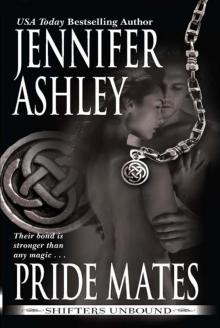 Pride Mates
Pride Mates The Duke's Perfect Wife
The Duke's Perfect Wife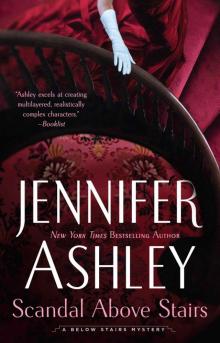 Scandal Above Stairs
Scandal Above Stairs White Tiger
White Tiger Midnight Wolf
Midnight Wolf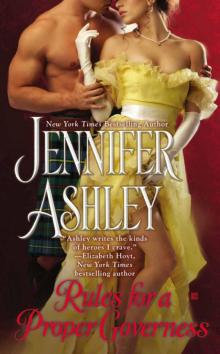 Rules for a Proper Governess
Rules for a Proper Governess Wild Wolf
Wild Wolf Bad Wolf
Bad Wolf Lion Eyes
Lion Eyes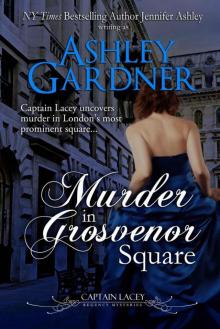 Murder in Grosvenor Square
Murder in Grosvenor Square The Untamed MacKenzie
The Untamed MacKenzie Wicked Deeds of Daniel Mackenzie
Wicked Deeds of Daniel Mackenzie Tiger Striped_Shifters Unbound
Tiger Striped_Shifters Unbound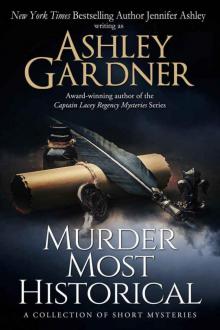 Murder Most Historical
Murder Most Historical Shifter Made
Shifter Made Mate Bond
Mate Bond Tiger Striped
Tiger Striped Bodyguard
Bodyguard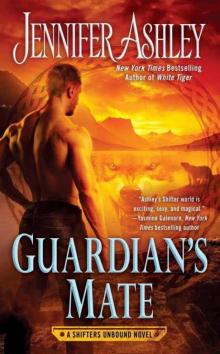 Guardian's Mate
Guardian's Mate From Jennifer Ashley, With Love
From Jennifer Ashley, With Love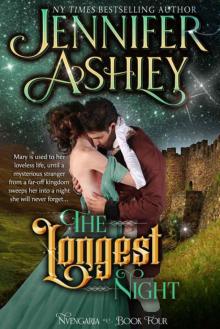 The Longest Night
The Longest Night The Stolen Mackenzie Bride
The Stolen Mackenzie Bride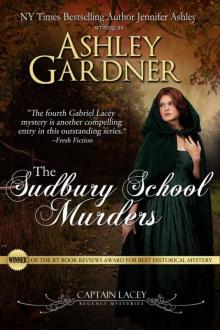 The Sudbury School Murders
The Sudbury School Murders The Care & Feeding of Pirates
The Care & Feeding of Pirates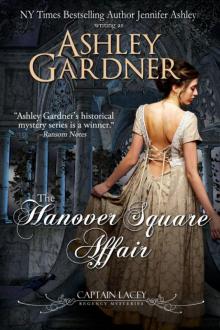 The Hanover Square Affair
The Hanover Square Affair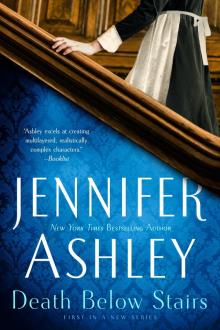 Death Below Stairs
Death Below Stairs Wild Things
Wild Things Wild Cat
Wild Cat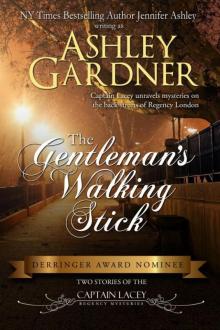 The Gentleman's Walking Stick
The Gentleman's Walking Stick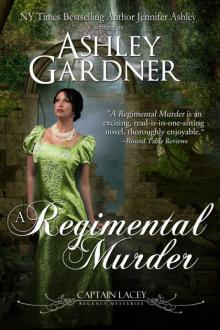 A Regimental Murder
A Regimental Murder Lone Wolf
Lone Wolf Forbidden Taste
Forbidden Taste Red Wolf
Red Wolf The Madness of Lord Ian Mackenzie
The Madness of Lord Ian Mackenzie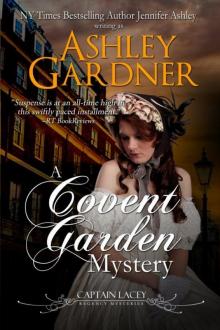 A Covent Garden Mystery
A Covent Garden Mystery The Pirate Next Door
The Pirate Next Door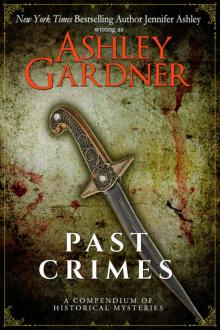 Past Crimes: A Compendium of Historical Mysteries
Past Crimes: A Compendium of Historical Mysteries Highlander Ever After
Highlander Ever After The Alexandria Affair
The Alexandria Affair A Shifter Christmas Carol
A Shifter Christmas Carol The Devilish Lord Will
The Devilish Lord Will Adam
Adam Kyle (Riding Hard Book 6)
Kyle (Riding Hard Book 6)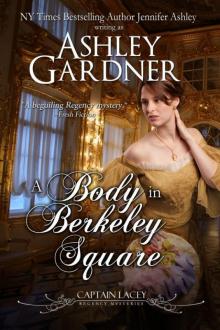 A Body in Berkeley Square
A Body in Berkeley Square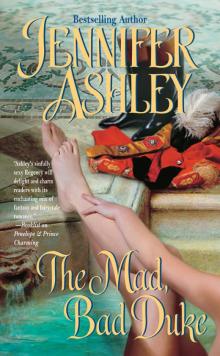 The Mad, Bad Duke
The Mad, Bad Duke Mate Claimed
Mate Claimed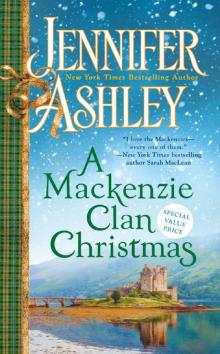 A Mackenzie Clan Christmas
A Mackenzie Clan Christmas The Seduction of Elliot McBride
The Seduction of Elliot McBride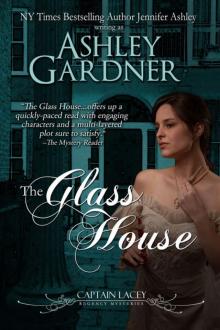 The Glass House
The Glass House Iron Master (Shifters Unbound Book 12)
Iron Master (Shifters Unbound Book 12) A Mackenzie Family Christmas: The Perfect Gift
A Mackenzie Family Christmas: The Perfect Gift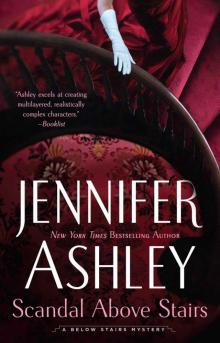 Scandal Above Stairs_A Below Stairs Mystery
Scandal Above Stairs_A Below Stairs Mystery Perfect Mate
Perfect Mate Murder in the East End
Murder in the East End Snowbound in Starlight Bend
Snowbound in Starlight Bend Hard Mated
Hard Mated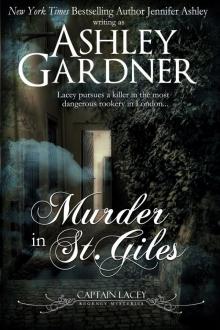 Murder in St. Giles
Murder in St. Giles Alec Mackenzie's Art of Seduction
Alec Mackenzie's Art of Seduction A MacKenzie Clan Gathering
A MacKenzie Clan Gathering Tyler
Tyler Lady Isabella's Scandalous Marriage
Lady Isabella's Scandalous Marriage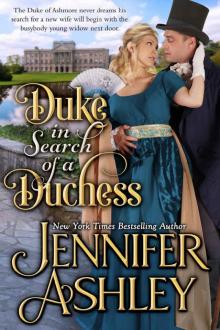 Duke in Search of a Duchess: Sweet Regency Romance
Duke in Search of a Duchess: Sweet Regency Romance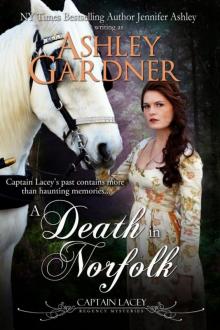 A Death in Norfolk
A Death in Norfolk Give Me One Night (McLaughlin Brothers Book 4)
Give Me One Night (McLaughlin Brothers Book 4) Iron Master
Iron Master The Many Sins of Lord Cameron
The Many Sins of Lord Cameron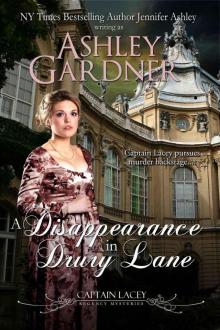 A Disappearance in Drury Lane
A Disappearance in Drury Lane Never Say Never (McLaughlin Brothers Book 3)
Never Say Never (McLaughlin Brothers Book 3) Death in Kew Gardens
Death in Kew Gardens Ross: Riding Hard, Book 5
Ross: Riding Hard, Book 5 Ray: Riding Hard
Ray: Riding Hard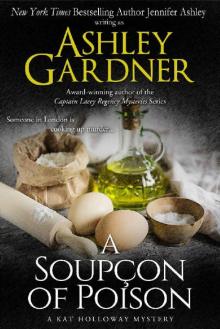 A Soupçon of Poison
A Soupçon of Poison Tiger Magic
Tiger Magic The Pirate Hunter's Lady
The Pirate Hunter's Lady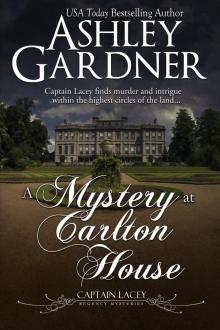 A Mystery at Carlton House
A Mystery at Carlton House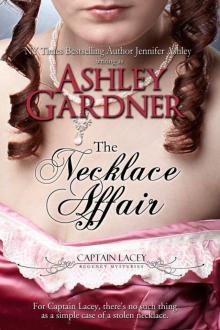 The Necklace Affair
The Necklace Affair Wolf Hunt
Wolf Hunt Scandal and the Duchess
Scandal and the Duchess Kyle
Kyle Why Don't You Stay? ... Forever (McLaughlin Brothers Book 2)
Why Don't You Stay? ... Forever (McLaughlin Brothers Book 2) Bear Attraction
Bear Attraction The Gathering
The Gathering A Mackenzie Yuletide
A Mackenzie Yuletide Wild Things (Shifters Unbound #7.75)
Wild Things (Shifters Unbound #7.75) The Redeeming
The Redeeming The Seduction of Elliot McBride hp-5
The Seduction of Elliot McBride hp-5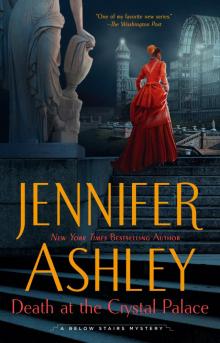 Death at the Crystal Palace
Death at the Crystal Palace Mackenzie Family Christmas: The Perfect Gift (highland pleasures)
Mackenzie Family Christmas: The Perfect Gift (highland pleasures) Forbidden Taste: A Vampire Romance (Immortals)
Forbidden Taste: A Vampire Romance (Immortals) Care and Feeding of Pirates
Care and Feeding of Pirates Shifter Made (shifters unbound)
Shifter Made (shifters unbound) Dark and Dangerous: Six-in-One Hot Paranormal Romances
Dark and Dangerous: Six-in-One Hot Paranormal Romances The Duke’s Perfect Wife hp-4
The Duke’s Perfect Wife hp-4 The Seduction of Elliot McBride (Mackenzies Series)
The Seduction of Elliot McBride (Mackenzies Series)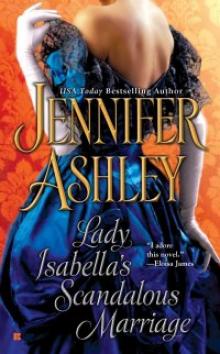 Lady Isabella's Scandalous Marriage hp-2
Lady Isabella's Scandalous Marriage hp-2 BodyGuard (Butterscotch Martini Shots Book 2)
BodyGuard (Butterscotch Martini Shots Book 2) The Wicked Deeds of Daniel Mackenzie hp-6
The Wicked Deeds of Daniel Mackenzie hp-6 Tiger Magic su-5
Tiger Magic su-5 The Madness Of Lord Ian Mackenzie hp-1
The Madness Of Lord Ian Mackenzie hp-1 Alec Mackenzie's Art of Seduction: Mackenzies (Mackenzies Series Book 9)
Alec Mackenzie's Art of Seduction: Mackenzies (Mackenzies Series Book 9) Mackenzie Family Christmas: The Perfect Gift
Mackenzie Family Christmas: The Perfect Gift Bodyguard (Shifters Unbound #2.5)
Bodyguard (Shifters Unbound #2.5) Midnight Wolf (A Shifters Unbound Novel)
Midnight Wolf (A Shifters Unbound Novel) White Tiger (A Shifter's Unbound Novel)
White Tiger (A Shifter's Unbound Novel) Cowboys Last All Night
Cowboys Last All Night Pride Mates su-1
Pride Mates su-1 Hard Mated (shifters unbound )
Hard Mated (shifters unbound ) Bodyguard (shifters unbound )
Bodyguard (shifters unbound ) Snowbound in Starlight Bend: A Riding Hard Novella
Snowbound in Starlight Bend: A Riding Hard Novella The Untamed Mackenzie (highland pleasures)
The Untamed Mackenzie (highland pleasures) The Untamed Mackenzie (Mackenzies Series)
The Untamed Mackenzie (Mackenzies Series)![Highland Pleasures [6] The Wicked Deeds of Daniel Mackenzie Read online](http://i1.bookreadfree.com/i2/04/07/highland_pleasures_6_the_wicked_deeds_of_daniel_mackenzie_preview.jpg) Highland Pleasures [6] The Wicked Deeds of Daniel Mackenzie
Highland Pleasures [6] The Wicked Deeds of Daniel Mackenzie Lone Wolf (shifters unbound)
Lone Wolf (shifters unbound)![Shifters Unbound [5] Tiger Magic Read online](http://i1.bookreadfree.com/i2/04/11/shifters_unbound_5_tiger_magic_preview.jpg) Shifters Unbound [5] Tiger Magic
Shifters Unbound [5] Tiger Magic Tyler (Riding Hard Book 4)
Tyler (Riding Hard Book 4) Ross
Ross Bad Boys of the Night: Eight Sizzling Paranormal Romances: Paranormal Romance Boxed Set
Bad Boys of the Night: Eight Sizzling Paranormal Romances: Paranormal Romance Boxed Set From Jennifer Ashley, With Love: Three Paranormal Romances from Bestselling Series
From Jennifer Ashley, With Love: Three Paranormal Romances from Bestselling Series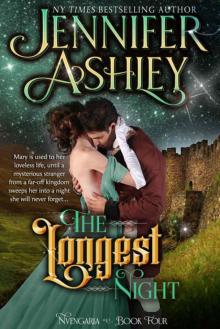 The Longest Night: Fantasy Romance (Nvengaria Book 4)
The Longest Night: Fantasy Romance (Nvengaria Book 4) The Many Sins of Lord Cameron hp-3
The Many Sins of Lord Cameron hp-3 Mate Claimed su-4
Mate Claimed su-4